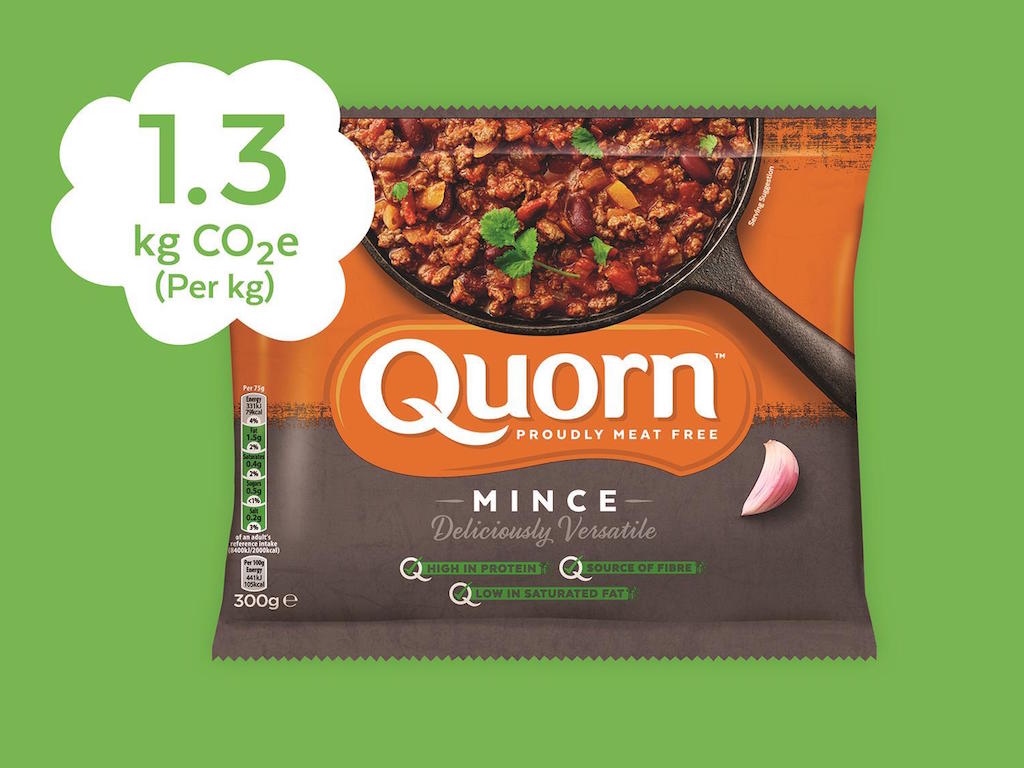3 Mins Read
In a bid to make the environmental impact of the foods we eat more visible to consumers, Quorn, the long-time vegetarian and vegan-friendly meat substitute brand, has just launched new low-carbon food labelling on their products. With this initiative, 30 of Quorn’s most popular products will not only be donning nutritional facts on their outer packaging, they will also showcase a full disclosure of each individual product’s carbon footprint as well. It comes as shoppers across the board are starting to wake up to the impact of meat and dairy consumption, and are looking to make more sustainable food choices.
Stepping up their efforts to market the sustainability of choosing plant-based foods, the established vegetarian and vegan meat alternative brand Quorn will now be adding the carbon footprint on their products on their packaging. The move to include a carbon label on 30 of their most popular products, including their vegan sausage rolls and meat-free vegetarian chicken-less nuggets, is meant to help consumers understand that Quorn’s proprietary protein blend generates 90% less greenhouse gas emissions compared to beef.
While the company has been working with the Carbon Trust to improve the sustainability of their products since 2012, this is the first time that Quorn will be disclosing the full carbon information to consumers directly. The label starts with the statement: “The carbon footprint for the full lifecycle of this Quorn product is 0.16kg per serving,” and showcases a comparative graphic that educates consumers on the carbon output of different foods such as bananas, tomatoes and meat. On the graphic, the impact of Quorn’s products is placed somewhere alongside fruit and veggies, far below that of the image of chicken and beef.
Founded in 1985, Quorn is a long-time player in the plant-based food industry, selling meat substitute products from meat-free mince, sausages and “chicken” strips to ready-made pre-packaged meals across 18 countries. Prior to the explosion in plant-based startups that have innovated vegan meat substitutes that biomimic the texture and taste of meat, Quorn’s mycoprotein-based meatless products was one of the few supermarket brands available to vegans and vegetarians.
While some of Quorn’s products remain only suitable to vegetarians as it contains egg albumen to bind their fungus culture, the brand has created a range of vegan-friendly items that uses potato protein.
Although the newly introduced labels might seem unnecessary to some consumers, especially given the seemingly widespread awareness about the environmental destruction associated with meat and dairy consumption, previous studies have demonstrated the efficacy of carbon labels in inducing more sustainable choices.
In a 2018 study, researchers from Australia and the United States found that a front-of-pack carbon emissions label can drive more eco-friendly food choices amongst consumers and that the lack of information for consumers to estimate the impact of different foods is impairing informed choices.
In the midst of our global food system crisis, which is currently contributing between 19 – 29% of global greenhouse gas emissions, driving biodiversity loss and resource wastage, the introduction of carbon labels on food presents one of the most feasible yet effective solutions that our planet needs. Choosing more sustainable foods would not only benefit the environment, but can bring further benefits to our health. In an Oxford University study, scientists revealed that most sustainable foods are correlated with health indices.
Lead image courtesy of Quorn.




